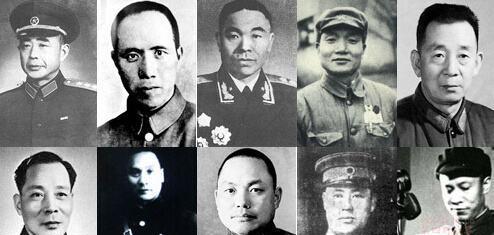Time entered 1949, and there were only a few ways out for the former Kuomintang troops and their generals: First, to conform to the trend of historical development and lead the troops to revolt and join the ranks of the people; the second was to abandon the armed forces as soon as possible, surrender to the people's army, and strive for leniency; and the third was to follow the old Chiang Kai-shek all the way to the black, either to retreat to Taiwan, or to resist to the end, or to die in battle or be captured. Therefore, in the War of Liberation, many Kuomintang generals chose the first one, such as Fu Zuoyi, Cheng Qian, Chen Mingren, Tao Zhiyue, Dong Qiwu, Lu Han, and so on.

Of course, there are also many stubborn people in the huge Kuomintang system, and with the exception of a few who have fled to Taiwan, most of them on the mainland have been captured by our army and become war criminals.
Next, Uncle Long wants you to talk about the commander of the national army, he did not choose to revolt, nor did he choose to surrender, after the defeat of the army, he chose to hide his name, he changed his name and ran to the countryside to prepare to marry a village girl, in order to live an ordinary family life from now on, so what happened later?
This man's name was Wang Lingyun.
Wang Lingyun is a native of Ruyang, Henan, born in 1899. In his early years, he served as a soldier in the Beiyang warlord Wu Peifu's department, but he did not expect to soar all the way in his military career, and by 1930 he had been promoted to the commander-in-chief of the Linyiping Zisi County Bandits, and in April of the same year he was incorporated by Zhang Xiao's 20th Route Army of the Nationalist Army as the commander of the 3rd Division. Wang Lingyun, who joined the nationalist army sequence, was successively sent to the Nanjing Higher Education Class and the Army University General Training Class for training, and was promoted by Chiang Kai-shek to the commander of the 76th Division during the Battle of Songhu.
In the Battle of Songhu, Wang Lingyun led the officers and men of the 76th Division to fight fiercely with the Japanese Kou in Fushan Town for four days and nights, during which he took the lead and went into battle shirtless, playing the prestige of the 76th Division, and lao Jiang was very happy to call the 76th Division "Fushan Troops".
After that, Wang Lingyun led the "Fushan Troops" to jiangsu, Zhejiang, Anhui, Jiangxi, Hunan and other places, and fought fiercely with the Japanese army countless times, and he successively participated in the Battle of Nanchang, the Battle of Guinan and the Expeditionary Force's Yunnan-Burmese War of Resistance, becoming a generation of famous anti-Japanese generals.
After the victory of the Anti-Japanese War, Wang Lingyun was promoted to lieutenant general and deputy commander-in-chief of the Yunnan Garrison General Headquarters and commander of the reorganized 9th Division. Later, as Lao Jiang provoked a full-scale civil war, Wang Lingyun was transferred to the Central Plains Battlefield.
After being transferred to the battlefield of the Central Plains, Wang Lingyun also began his downward spiral on the way to the army.
In November 1947, Wang Lingyun was dismissed from his post as commander of the reorganized 9th Division because he was accused by Lao Jiang of being too slow in his determination and slow to move, and was transferred to lieutenant general Gao Shan of the Ministry of National Defense, and in December of the same year, although he was appointed commander of the 13th Appeasement District, in early 1949, after Wang Lingyun was defeated and retreated to Xiangyang, he was seized by Song Xilian, so he had to come to Sichuan in a hurry, relying on Zhang Qun and Hu Zongnan, to serve as the commander-in-chief of the Advancing Army in the Yu-Shaanxi Border Region and the director of the Yuxi Bureau, and deployed in the Dabashan area to resist in an attempt to resist.
When at the end of 1949, after our people's liberation army entered the great southwest, the unstoppable war situation determined that the Kuomintang soldiers in Sichuan must make the ultimate choice of their lives, or revolt or surrender or escape.
The path chosen by Wang Lingyun is indeed different, and it is actually anonymity, trying to find a village girl to marry in order to escape the judgment of history and the people.
At the beginning of 1950, Wang Lingyun, alias Zhang Keming, found a village girl in Tongjiang, Sichuan Province, to marry, and prepared that he would become an ordinary person for the rest of his life. The idea is good, but you have to give history an account, and it is not too late to be an ordinary person after you have been judged and punished.
Later, when the village girl learned of his origin, she was denounced by the village girl, became a prisoner of our army, and was sent to Gongdelin to study labor and reform her thinking. After 11 years, Wang Lingyun was pardoned and could finally be an ordinary person with peace of mind. After that, he first learned the technique of cultivating fruits in the apple orchard of Hongxing Commune in Daxing County, Beijing, and then became a commissioner of the Secretariat of the Henan CppcC after arriving in Zhengzhou. One day in September 1968, after being shocked, he ran away from home and his whereabouts are unknown.
More Exciting Articles:
During the Battle of Huaihai, he was captured by our army, and later wrote a research article to receive preferential treatment, and the first batch of amnesty was granted
He is the love general of the old Chiang Kai-shek, in 49 years he did not revolt or go to Taiwan, but became a monk, what is the end?